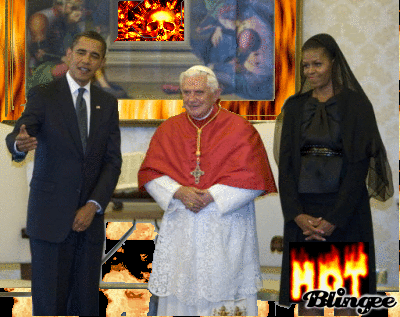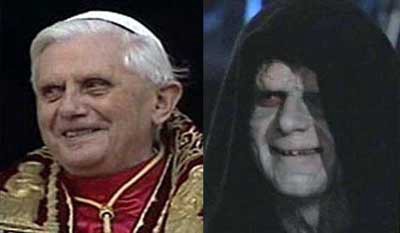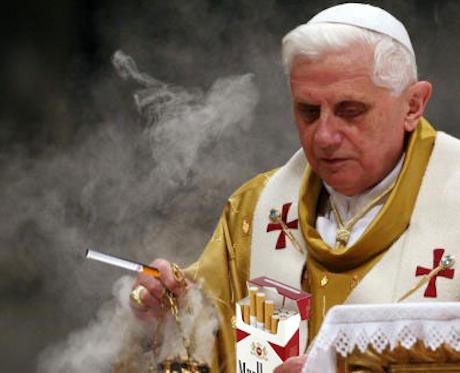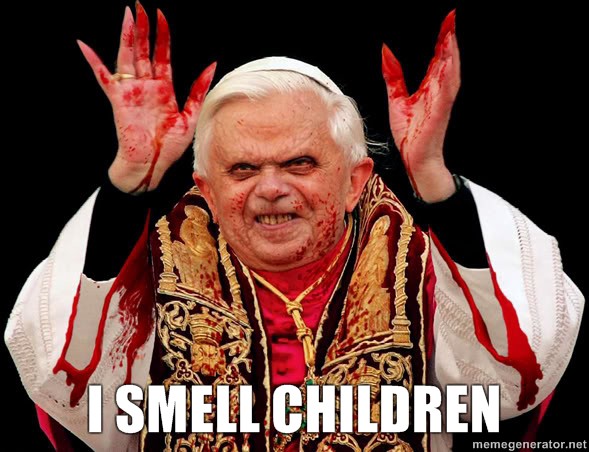How To Not Be Ezra Klein
Remember when I was all, “You know why I won’t do press?” and you were like, “Gee, let me guess, because nobody’s interested?” and I laughed my insouciant laugh even though your words hurt me very badly and I still hold a potent, furious grudge which most days I am barely able to restrain? You don’t? Well, let me remind you. If you don’t find that convincing (although I’m not sure why you wouldn’t, it’s BRILLIANT) let this New Republic profile of Ezra Klein be a lesson to you: There is no way you’re going to get out of one of these things without coming off in some way flawed. Look, I’ve never met, corresponded or otherwise interacted with Ezra Klein (he’s an “incredible operator” who schmoozes up is the point of the piece; he’d have no use for me anyway). He might be some kind of secular saint put here to make the world a better place or he might be the Pol Pot of mainstream media policy-focused web logs. Either way, it makes no difference: No matter who you are there are going to be at least three people in your life, one of whom you consider a friend, who will be willing to talk shit about you anonymously to a reporter who is desperate for shit to be talked because otherwise who wants to read the article in the first place? Think about how you are with your own friends, when there are no journalists around (or even if, God help you, your friends are journalists, and they just happen to be off-duty); think about how you let your basic (and, to be sure, completely natural) envy and displeasure color the conversation about whatever unlucky sap happens to be somewhere else that night. There’s no avoiding it, and this is one hundred times more true when it comes to these kinds of stories. Making it even more uncomfortable, Klein is well aware of this, and goes through all sorts of contortions in the piece to somehow minimize the damage, which naturally makes things even worse (and which the reporter, who is doing her job — which, let’s never forget, is to make her subject look human, i.e. bad — delights in describing). Depending on who you are you will either read this piece and think, “Oh my God, Ezra Klein, what a dick,” or “Oh my God, Ezra Klein, you poor thing,” but if there’s anything I can teach you in the short time I have left let it be this: DO NOT DO INTERVIEWS. You just can’t win.
You Can Walk or You Can Run
How’s the state of your nation-state? Mine is sort of “eh.” The Laramie Project Cycle opens at BAM (with a gala!), Ron Currie and Phlilip Lopate read (separately, and I’m not suggesting that you go see them), and there’s a sold-out reading with George Saunders and Thomas Frank and others at the New Museum, if you can sneak in. Also don’t get tricked into going to see the Dead Kennedys, it would just disappoint. It’s a day of ambivalence! I blame Obama.
"House of Cards," Episodes 9-13: The Ones Where Everything Goes Nuts
by Jane Hu and Carrie Frye
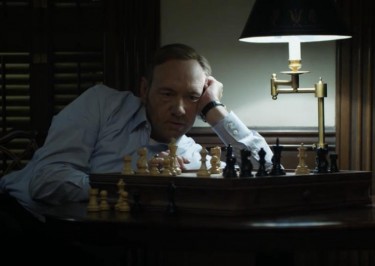
Carrie: How smart of Netflix to release its series a week before a historic blizzard hit the Northeast. I wonder how many people who had no intention of ever watching this show ended up reluctantly streaming it this weekend, because it was that or the 9th rewatch of All About Eve or Grizzly Man?
Jane: Now, I don’t think one could ever watch Grizzly Man enough times, but beside the point! (If Netflix ever wants to release a 13-part Herzog meditation on chaos and murder, though…) Did all of Netflixing NYC spend the weekend colluding with Frank Underwood? Inversely, when hysterics about snowfall (along with attendant talk of “House of Cards” marathoning) made its way onto the media streams of Canadian me, I only began to feel how small a tempesty teapot we might be sitting in. Paranoia set in: did NYC overreact about the blizzard? Did I overreact about “House of Cards”? Was NYC, first blizzarding, then slushing NYC, alone watching “House of Cards”? How are we all doing?
Carrie: Well, after our last chat, I watched the final two episodes, which I’d rationed away — and holy cats! Looking back, I feel wildly naive for everything I thought about these characters back in the early episodes — most especially Frank Underwood. So, for this final, spoilers-for-the-whole-shebang chat (and there are MAJOR SPOILERS too, so turn back if that matters to you), let’s focus on the man from Gaffney and everything that we now know about his plans.
Carrie: Phew, here we are after the “Read More” jump, able to talk freely. So Jane, which moment did you find more shocking: When Frank murders Russo or when he flies ass-over-teakettle off his rowing machine?
Jane: That rowing machine was just asking for trouble (did it also remind you of Spacey-circa-Lester-Burnham?) but I wasn’t expecting quite so ungraceful a topple — though I wasn’t surprised that it was accompanied by special foreboding music. Dramatic emphasis on how Frank is becoming literally unhinged: metaphor-spoiler? It was refreshing still, as I was growing to trust Frank, as well as the faith “House of Cards” placed in Frank’s power, so much as to find it becoming a bit tedious. That scene where Frank impromptu-murders Russo! That did not happen in the BBC version, in which Frank deliberately mixes rat poison into Roger O’Neill’s (it’s Russo’s) cocaine, and with the help of Mrs. Francis too. In Fincher’s version, you really see how insanely, desperately intent Frank is on following through with his intended plot. *Cue “Mack The Knife.”* Impromptu Murderer™ Frank: can we trust him anymore?
Carrie: Yes, our trust is eroded on two fronts. Not only at knowing he will commit murder — except there was such menace in that earlier bathtub scene with Russo, I don’t know why I was so surprised when Frank’s gaze started shifting around that garage — but he also showed himself in these episodes as… not nearly as omnipotent and nimble at manipulation as I had thought him. You see it when he says to Claire, “Is it the hot flashes?” (He was extremely lucky that she didn’t commit an Impromptu Murder™ of her own there.) He’s lost his footing and his ability to control people, and he stalks around the hallways of Washington like some tufted, hooved Gaffney Beezlebub, one so bad he will even blow out other people’s prayer candles (that’s a baaaad man).
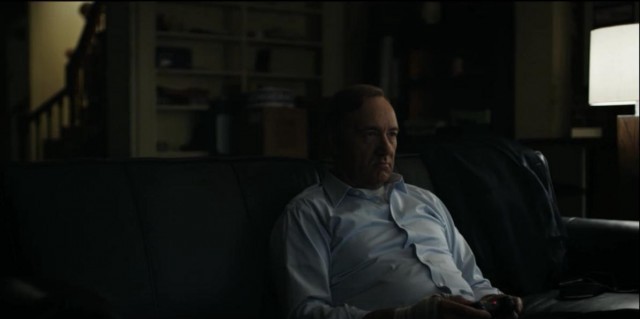
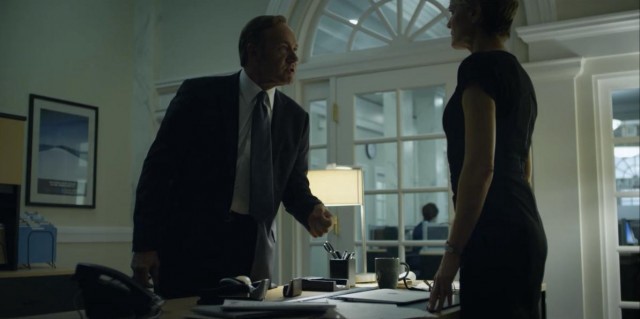
Jane: Aside from when his old friends show up at the Sentinel, Frank is rarely ever surprised — until now! That scene with Claire also reminds me of when Zoe stands him up and he goes home to sulk with his video games. Or when Frank’s sitting outside the President’s office and instead of being our eye through the keyhole, he’s nervously jabbering about all the potential meanings of what this unusually long meeting might mean, until Linda comes out and, yup, startles him.
Even with Russo gone, we’re getting less and less time with Frank, while simultaneously Zoe’s plot (unwittingly one against Frank) begins to loom larger. The viewer is privy to all these conversations Frank is completely oblivious to and his less-than-omniscient perspective makes me retrospectively question what’s happened before. It’s a neat turn! For this change to occur so late in the game is partly satisfying, also partly horrifying. Did you feel like you needed to realign all your prior notions as well? I felt like I was losing footing along with Frank, and the final scene is less a cliffhanger than quietly ambivalent.
Carrie: In these last episodes, Doug Stamper seemed off, too, heavy-handed when he should be light. (Walking up to the table where Janine and Christina were meeting while holding a neon-yellow “There is indeed a story here” sign seemed especially unwise.) Presumably his knowledge of Russo’s murder and complicity in its cover-up has shaken him.
So much of what we, the audience, understand of Frank’s character hinges on promises. In the first episode, he’s upset by the broken promise from the president and he seems like this lone, flawed, but, ultimately, morally bound man. The same type of guy who tracks down drivers who commit dog hit-and-runs, etc. And the show’s structure feels like it will follow a “Revenge”-style format, where the wronged party is also the righteous one, who then sets out to knock down his/her enemies one by one across the season. And then in episode 4, someone asks Frank if he “lied to [someone’s] face,” and he responds, “I revised the parameters of my promise” — and everything starts to shift.
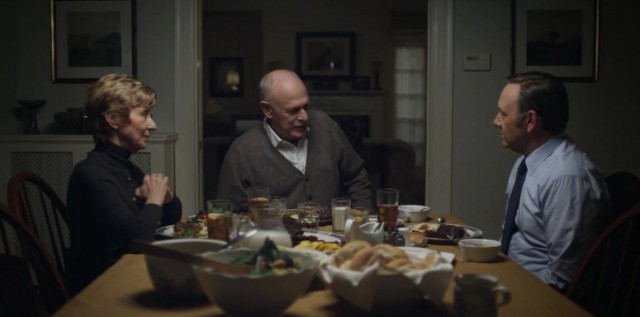
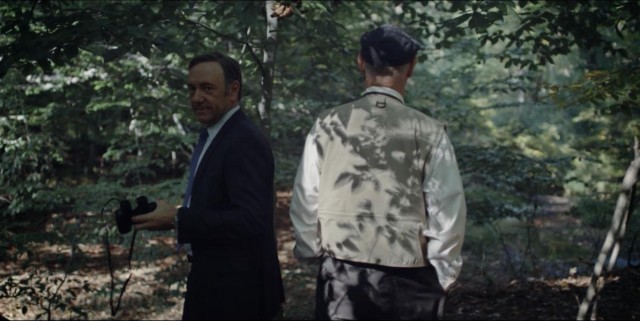
It’s satisfying, though, how well the groundwork for the final third was laid in the early episodes. Frank’s mention of his father as a failed, featureless man while on the pulpit in Gaffney felt almost throwaway, but then his father’s failures reemerge during the meeting with Tusk. There the mention underscores the father-and-disgruntled-son dynamic between the two of them. Kevin Spacey’s uncomfortable, peeved body language throughout that visit with Tusk is wonderful. There’s the scene where the two are standing “out in nature” and when Frank is facing away from the camera, even his back looks pissed off. (Also: Did you get at all worried about Tusk’s canary while Frank was a houseguest? I thought that bird might get Peter Russo-ed before that episode was over.)
Jane: Russo-ed! Look what you’ve started now.
Carrie: The verb has a whole sad new meaning now.
Jane: At this point anything feels possible (except defeat, which Frank just won’t abide), but on top of the lengths Frank will go to secure his Vice Presidency, he also seems to be on his last legs, so a casual offing prompted by pure stress is suddenly… always already a possibility now. But you’re right too, in that promises have been a defining point of Frank’s actions. He makes unspoken promises with all those around him, but they’re often in the form of Frank gives them something, for which he’ll hold over their heads until the favor is returned (“investment,” he calls it). This always gives Frank the upper hand, but now the scales have shifted, especially with Tusk, who expects future recompense for giving Frank what he wants now. Finding himself now at the opposite side of the bargaining table is a less-than-pleasant experience. The Frank from episode 1 would have done differently — more deliberately, I think — but he’s just so nerved-out at this point. Taking up jogging is probably a good call.
Carrie: His wounded vanity when Zoe stands him up and then ends their sexual arrangement sets off the rampage of bad decisions and miscalculations, including that sulky video-game playing which alienates Claire. What did you make of the scene where Zoe visits the Underwood house and stalks around the bedroom in retaliation for Claire’s visit to her apartment?
Jane: Zoe’s invading Frank’s home and trying on Claire’s dress (without her knowledge) doesn’t feel quite enough to settle all bets, though that scene did make me realize that, as yet, we’ve seen Zoe and Frank in a bedroom together more than we’ve seen him and his wife in theirs. (Though Claire is almost exclusively in Adam’s bed when she’s visiting him.) Outside of the office, insidious business transactions seem to occur almost exclusively in the bedroom. What’s that truth bomb Frank drops near Zoe’s bed? “Everything is about sex, except sex, which is about power.” Whoosh.
A lot of real-talk happens in Zoe’s bedroom, but now she’s spending all her time at Lucas’! (It seems a subtle way of claiming her privacy, as well as signaling that that relationship isn’t this: our girl is learning.) OK, fine, Lucas’ apartment is also just nicer. What else? There’s Frank being forced to accept Tusk’s hospitality by sleeping in his guest room (who owes whom is established early on; and note that at the end of his visit Frank refuses to let Tusk order his car to the airport), as well as Rachel being in Stamper’s — and so Frank’s — debt as he finds her places to rest. I suppose all anyone is ever looking for is a bed to sleep without a broken spring.
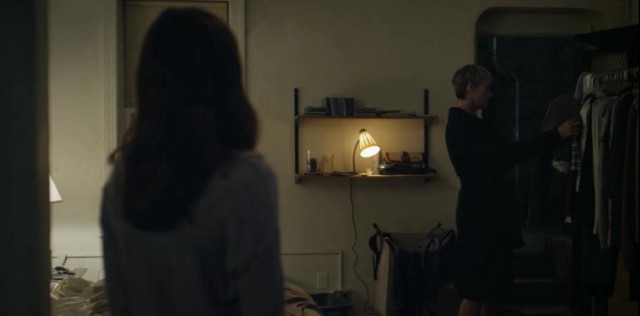
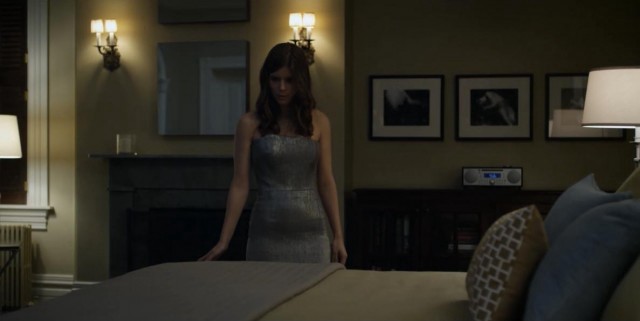
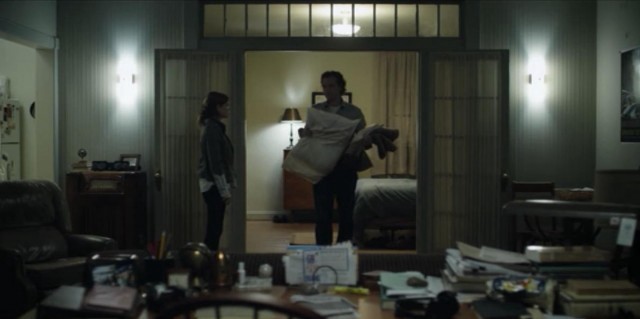
Carrie: Even in the one scene where he and Claire are in the bedroom, she’s choosing what to wear to meet another man. To jump from the bedroom to a closely related topic: Claire’s desire for kids is a major blind spot for Frank. I wish the show hadn’t so baldly addressed her desire at the end, with the visit to a fertility doctor; I liked it more when it was implicit: Her light answer to why they never had kids — “we never wanted them” — and his later aside to the camera after Russo’s son runs into him: “I despise children, there I said it,” which revised her “we never wanted them” to “Frank never wanted them.” So when he announces to Russo, as they’re drinking whiskey together before the Impromptu Murder™, that the decision was made early in their marriage, and that it was final, we’ve anticipated the disclosure. It’s this seething lava pool underneath their fight in their office and, shockingly, he never seems to realize it. When, exasperated, he says that her charity, aka life’s work, isn’t important, the blow is much worse than he gauges. It’s notable that she doesn’t brave telling him about the doctor’s visit in that last kitchen scene before their jog.
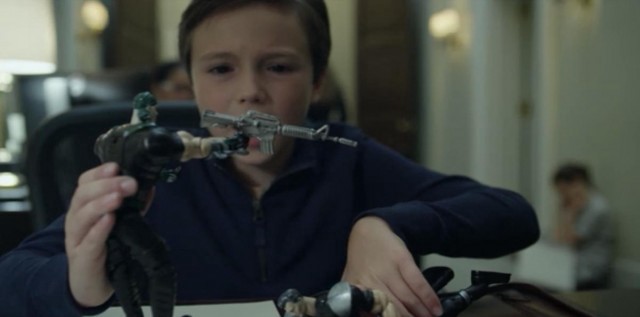
Jane: In terms of Frank’s role as a politician, his hatred of children seems especially intriguing (and thank God too, I can’t imagine him in any fatherly role outside of the Electra complex he’s got going with Zoe?). What with all the talk about education and futurity, as well as Frank’s ability to foreshadow waaay long, it’s interesting that Frank cares nothing about or for the actual future. “Love of family,” he says mockingly in episode 4, “most politicians are chained to that slogan: family values.” Frank is concerned about the future of a library named after him, but he doesn’t consider (as Claire seems to, albeit for less crooked reasons) that progeny might be the easiest way to ensure his legacy.
But this attitude is also what makes me believe that Frank would be the ideal political candidate for the times — so coldly detached from family feeling as to be able to manipulate the nation’s attachment to melodramatic narratives of children, change, and hope without buying into them himself one whit. I did love the opening of episode 9 where Russo’s son plays by having two action figures battle one another (it reminded me of a similar scene in Todd Haynes’ [Safe] where a boy of similar age talks excitedly of gang crimes in lurid detail). Of course, Frank isn’t concerned with how a President’s decision on war, or media portrayals of it, will shape the children and their futures. Frank has achieved this total break between reality and his effect on it — this is his most horrific aspect, really.
For a moment too, I thought Claire’s visit to the fertility doctor was her gauging whether she should have a child if it comes to a legal battle between another (sympathetically) pregnant women and herself. This is how duplicitous “House of Cards” has made me! But your take suggests that in contracting with Frank, Claire has forfeited children. What a trade.
Carrie: Ha! That hadn’t occurred to me, but now… *thinks furiously*. *Begins wait for Season 2.*
Previously: “House of Cards,” Episodes 1–3: Bloggers With Their Wine and “House of Cards, Episodes 4–8: Who’s Making Themselves Available
Jane Hu plans to take up jogging while she waits for Season 2. Carrie Frye ordered a rowing machine.
New York City, February 10, 2013

★★★★ Down below the living-room windows, under a bright morning, people were sliding with a toboggan and a saucer where no hill had been apparent before. The black branching shadows of the trees overlaid them, and the plastic of their sliding vessels glinted. A man seated himself behind a child in the toboggan and rowed with his arms down the little slope, letting go for the last few feet, then pitching backward as the front end caught up on a rising snowbank. Out on the east side of Amsterdam, there was a wall of trashbags, mortared with snow. Sun shone through the snow atop construction barriers, six distinct light-and-dark layers of it, a mille-feuille of the storm’s history. Tires sloshed by on the sunny roadway; a bicycle lifted a skinny rooster tail of dirty slush behind it as it passed. The curb cuts were swamped. Islands of slush poked above blue reflected sky, if you faced uptown. Facing downtown, the water was the color of asphalt. A woman walking that way, in athletic shoes, sank one foot through the gray surface and exclaimed in dismay. Soft, thick ridges of snow, medium gray, still lay in the travel lanes of Broadway, pushed this way and that by each new set of wheels. Flashing drops of water dribbled from the supermarket awning, all along it. Thin streaks of white traced the uptown side of the trees, 15 feet up or more.
Germany Not Just The Land Of Chocolate
“Here in the homeland of schadenfreude, the zeal for unmasking academic frauds also reflects certain Teutonic traits, including a rigid adherence to principle and a know-it-all streak. ‘I just think that many Germans have a police gene in their genetic makeup,’ Dr. Rieble said.”
The Title For The New Book By Percival Everett Will Not Be Very Hard To Remember
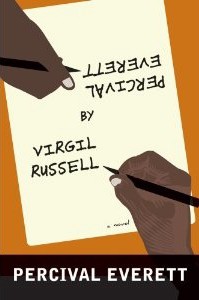
For a long time I would start my sentences with “In a more perfect world,” but as my inexorable march toward death has collected celerity I have found myself considerably more likely to accept the inevitable and do my part to glean the good in things, no matter how difficult they are to discover and ultimately unsatisfying they may be, which means I am making many more declarations front-loaded with resignation and grudging acceptance about how “I guess we should be happy that we live in a world where.” Which is to say that while in a more perfect world the novelist Percival Everett would dominate the bestseller list to such a degree that they would need to give him his own category, Harry Potter style, I guess we should be happy that we live in a would where the novels of Percival Everett still get published on a regular schedule and we’re all able to read them, the latest case in point being Percival Everett by Virgil Russell: A Novel, which Lydia Millet says is “like a carnival ride, but not the kind where you vomit.” If that’s not enough for you, I don’t know what is. Seriously, reconsider your life choices. (This, this or this may be easier entry points, but the man is practically A Goddamn National Treasure so you can’t really go wrong wherever you begin.)
Freshness Subjective
“Fresh doesn’t have to be low-calorie or even especially nutritious — a burrito with ingredients prepared on-site at Chipotle may pack three times the calories of a burger. Nor does fresh require pathologically locavorian supply-chain standards: As Arby’s has revealed, a sandwich from Subway might contain cold-cuts processed, packaged, and shipped from a centralized facility in Iowa. Better yet for retailers like Taco Bell, Domino’s, and Arby’s, the mere implications of freshness can be sold at a premium to new customers who otherwise might have avoided those chains’ wares altogether. The only unabashedly pure thing about the concept of fresh is its subjectivity.”
Tom Wolfe's "Back to Blood" Cost $112 Per Reader
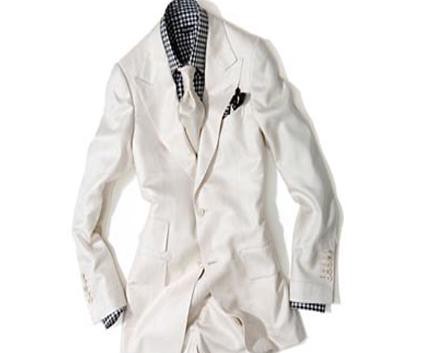
From this nice little profile of Karen Russell, the Pulitzer-shortlisted author of Swamplandia!, comes this nugget. Tom Wolfe’s lastest, “Back to Blood,” which went with him five years ago when he left FSG, for the cost of around $7 million, has sold 62,000 copies to date. (That’s according to Nielsen BookScan, which does not record sales at WalMart, Sam’s Club or BJ’s. Not sure how well Tom Wolfe performs at WalMart anyway though!) That’s at least a hundred bucks in advance per copy sold. These things happen.
The "Best" Internet Pictures of the Quitter Pope
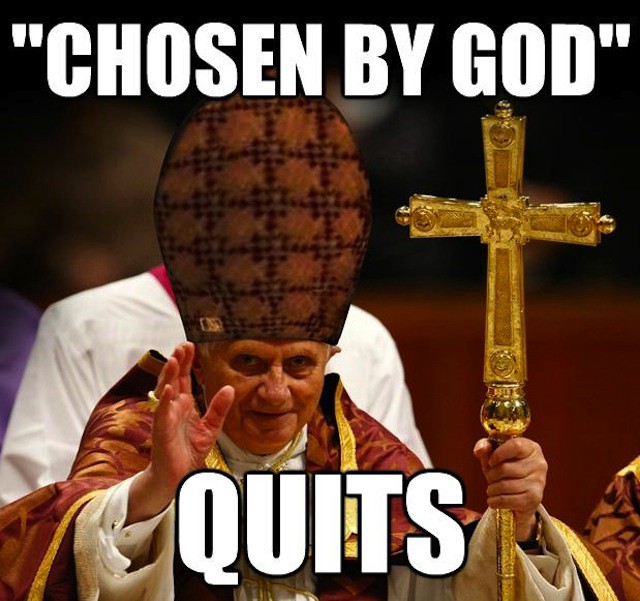
When this Ratzinger character first became the pope in 2005, it finally seemed like there really was a God … and He obviously loved all the funny pictures and animated GIFs and Star Wars references and constant talk about Hitler on the Internet. Joseph Ratzinger was many things, none of them good, yet paradoxically he was also so very, very good for the Internet. In a way, he was the Internet in human form, much as Jesus Christ or Shiva or Thor were all supposedly God in human form.
Anyway, such great material! We’re all going to miss him very much. Sadly, the next pope (“The Last Pope,” according to probably Nostradamus or Glenn Beck), will be a lady robot. So enjoy this collection of Pope Benedict XVI slash graphics.


